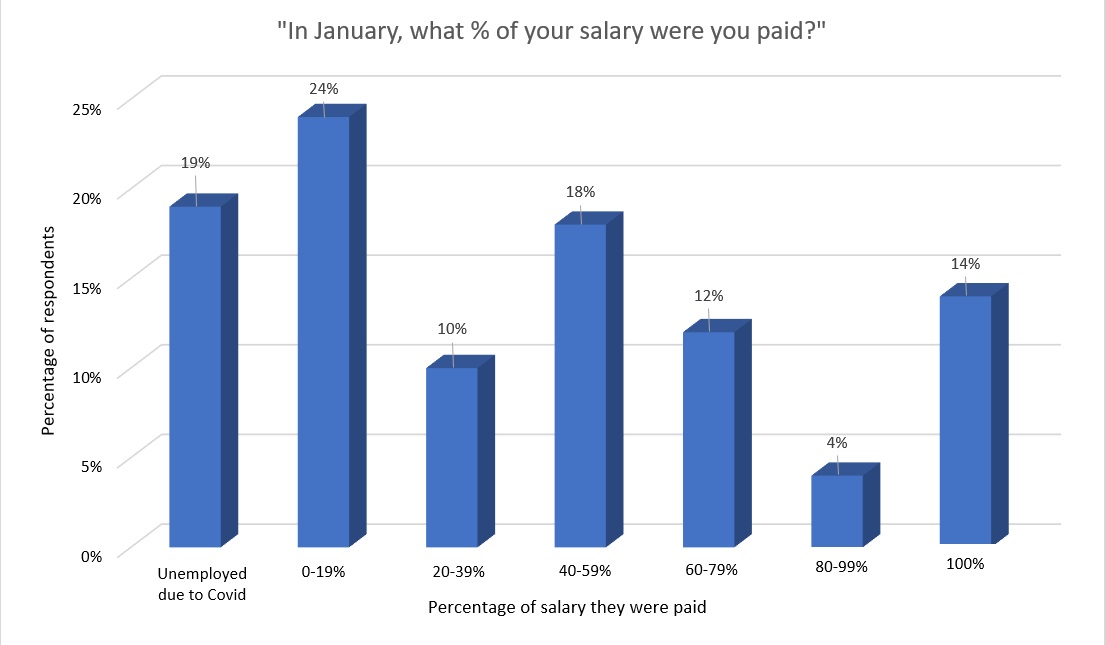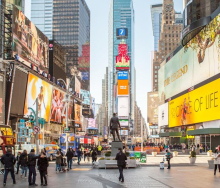Travel News is conducting a monthly survey of salaries in travel in order to build an industry barometer. The larger the sample, the better the barometer we can build, so please participate every month – it will be visible for a week from the first Wednesday of the month. We will share the results monthly and build a graphic record, showing the trends over a year.
The January poll had a significant turnout of 473 respondents. It showed that 19% of readers are unemployed due to COVID’s effects. 52% of respondents said they were earning under 60% and only 14% said they were getting 100% of their salary.

The global picture is equally alarming. In August last year, data platform Statista predicted that the global travel and tourism market would see a loss of almost 101m jobs by the end of 2020. The World Travel and Tourism Council’s projections made in October last year, are even more dire, estimating that up to 174m jobs could be lost in 2020 if restrictions on global travel continued. Both these projections were made before the second wave.
Second wave woes
Kim Botti, director of specialist recruitment agency, Lee Botti & Associates said: “We have seen a variety of options implemented by companies, where they have either tried to retain their staff on reduced hours and offer some sort of contribution, or where there has been a no-work-no-pay policy,” adding that there had been a second flurry of retrenchments triggered by the overwhelming second wave.
She told Travel News that, until there were regular flights in and out of South Africa, it would take some time for things in the travel industry to turn around, and that some jobs would not return in the short term as companies re-engineered to reduce their fixed costs. Displaced travel and tourism workers had been applying for temporary or contract work in administrative or secretarial spaces according to Kim. “They wish to return to the industry they know and love when things pick up again, but need to earn in the interim.”
Ceo of Asata, Otto de Vries, said it was distressing to see the travel industry on the verge of collapse and hard-working travel agents being placed under increasing financial pressure in 2021. “The implementation of travel bans for travellers from South Africa means that there are still no short-term signs that the situation will improve. There is also no clarity on what is needed in order to restore confidence in travel and to allow the industry to rebound,” said Otto.
Club Travel executive manager: franchise, Jo Fraser, said Club Travel employees considered themselves fortunate to be earning between 50% and 70% of their salaries at present. “Payroll constitutes 65% of Club Travel’s monthly expenses. We reacted early, retrenching about 200 people during June, as we understood that TERS was meant to be ending at that time. As we are a large company, we were fortunate to have substantial cash reserves, which has allowed us to continue paying the bulk of our employees 70% of their salaries but this is not sustainable in the long term,” said Jo.
Md of World Leisure Holidays, Ramesh Jeenarain, said it was tricky to find that fine balance between retaining jobs, while also attempting to extend the business’s financial runway for as long as possible to ensure that the business would still be able to employ staff when the industry recovered. “This is becoming increasingly difficult to do as cash reserves continue to deplete,” said Ramesh.















